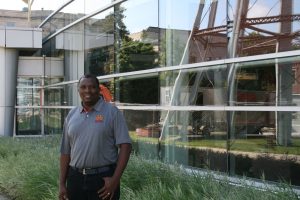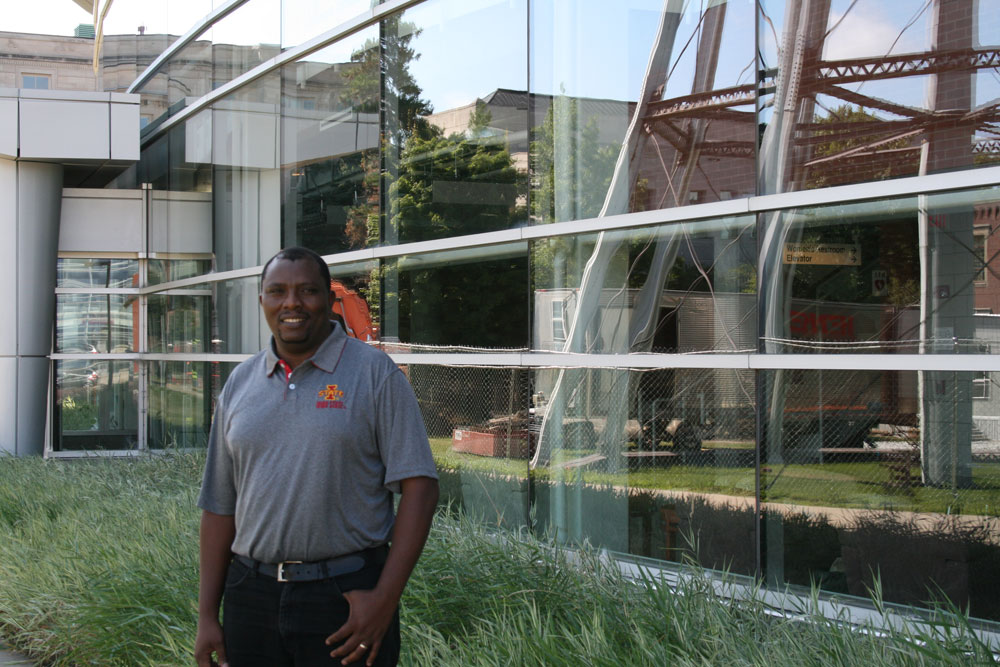Materials engineering department hires assistant professor
“Was there another option? I don’t think so. There is just something special about learning something and passing it on to those coming after you,” Martin Thuo said about becoming a professor.
Thuo recently joined Iowa State as an assistant professor in the Department of Materials Science and Engineering.

He said he enjoys being a professor for two different reasons: mentoring and solving problems. For him, mentoring someone in research and seeing them achieve greatness is satisfying. Equally so is helping students figure out problem-solving methods. “So these two interests are embodied in the definition of a professor, and that’s why I became one. I don’t know if there was another way that I could have gone.”
Thuo’s teaching methods stress problem solving through comprehension rather than memorization. “I try to emphasize that if you have difficulty somewhere in a course, go back to the last point where you understood the concept(s) and build up; that is, when in doubt, go back to the basics and ‘discover’ your way to the solution,“ explained Thuo. He wants students to discover and internalize the knowledge so they can solve future unknown challenges through intuition, or a “gut feeling,” rather than reading up a list of rules.
“Discovery does not come with an instruction manual and neither will the problems my students will face when they start their careers. I want to teach them how to be resourceful in unfamiliar territory,” said Thuo
Originally from Kenya, Thuo came to the United States to get his doctorate in chemistry from the University of Iowa followed by postdoctoral fellowships at Harvard University. He taught for a year at the University of Massachusetts.
Researching different aspects of soft materials
Soft materials, including everything from gel, rubber to most of what makes up the human body, are at the heart of Thuo’s research. The basis of his research is “frugal science,” or finding affordable solutions to some of the world’s most complex problems like clean water supply, health care, transportation and pollution.
His research applies polymeric materials, and other soft materials, in low-cost nanofabrication, materials synthesis, self-assembly, and low-cost, bio-analytical devices.
One project in his lab studies charge transport in small molecules. In this project, Thuo and his research team use self-assembly to create a single layer of molecules on a metal surface, the so-called self-assembled monolayers, as well as smooth electrodes that they use to contact the monolayers and measure electrical current going through the molecules.
In another project, Thuo is working with an MSE graduate student to develop paper-based, low-cost diagnostic devices. The researchers combine advantages already inherent in paper as a material with polymer synthesis to create materials with tunable surface properties.
Solving problems, not just doing research
When asked why he is passionate about research, Thuo explained, “To say research is not the right word. I am passionate about problem solving. I see a problem, and I want to solve it. It’s what keeps me going. Research is basically an exercise in problem solving.” Thuo’s interest in heuristics comes from his childhood in Africa, where there are a lot of challenges.
Thuo believes that problem solving is the most important part of the research process, as once an issue is identified, it is translated into a research question. He said, “Eventually, the goal is that the problem is solved, and in the process we discover great science.”
While solving problems, Thuo collaborates with different research disciplines. He knows he cannot be an engineer, physicist, chemist and social scientist all at once, so he collaborates and accepts when he does not know something. “One of the things I’m looking forward to is going across departments and across disciplines to learn and share with my colleagues. ISU, and the CoE in particular, offer this interdisciplinary collaborative environment.”
He also has plans to recruit talented undergraduate and graduate students from a variety of backgrounds to help with his research projects. He believes he has a job for any science major, “There’s always something in my research group for someone to do; they just need to be curious, eager to learn and willing to get out of their comfort zone.”
